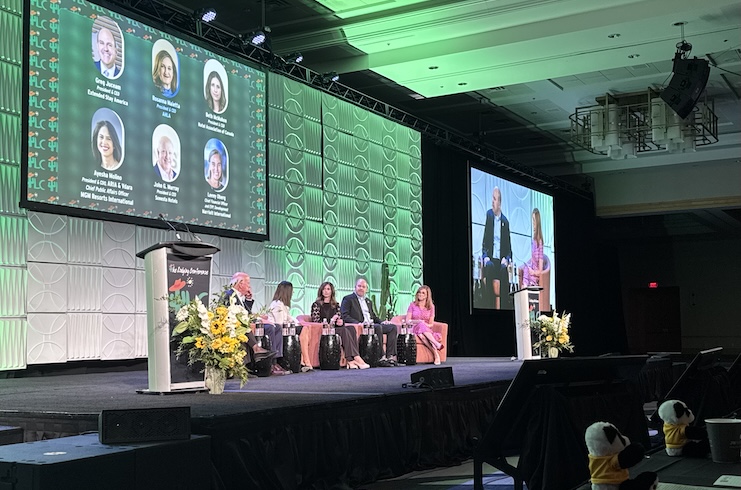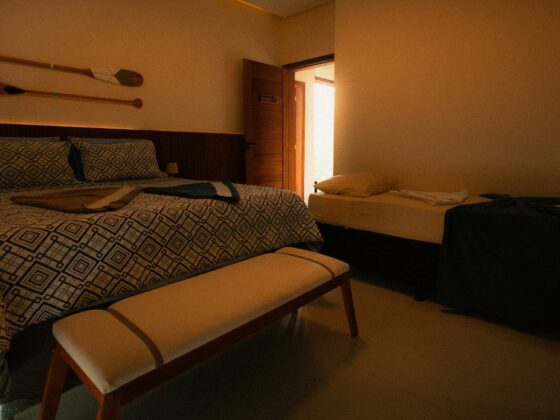
On the third day of The Lodging Conference, the state of the industry remained a high-priority conversation among everyone in attendance. During the “Executive Briefing Part III” panel, hospitality leaders discussed demand trends, the impact of economic conditions on different market segments, and regional market performance and future projections, among many other topics. Led by Rosanna Maietta, president and CEO, American Hotel & Lodging Association, the panel also focused on AI and technology in hospitality and additional areas of innovation.
Regarding demand trends, Leeny Oberg, chief financial officer and executive vice president, development, Marriott International, noted the industry’s in-depth focus on “leisure and luxury, and while it has quieted down a little bit as we’ve moved through the year, it has been remarkably strong, particularly strong on the ADR side. We see that across our resorts, we see it across our luxury hotels, very much on the retail side of things.”
However, Oberg continued, “It’s when you then start to move into the lower chain scales that you’re seeing this demand weakness. And it’s interesting that it’s in a couple of places that are noteworthy, and one is the booking window.” Oberg shared that 40 percent of transient business in the United States has shown a booking window of less than four days. Additionally, group and retail demand have been up in the United States, with less government travel negatively impacting the lower chain scales, and corporate remaining flat, according to Oberg.
Ayesha Molino, president and COO, ARIA and Vdara, and chief public affairs officer, MGM Resorts International, said the company is noting similar demand profiles for its luxury properties. “I think the macroeconomic conditions are certainly impacting that. There’s been this steady change that’s been happening in the last year. Certainly, I think the prolonged inflation impacts are having their total of course, tariff impacts, and wage inflation has stabilized since post-pandemic, when it seemed like it was outpacing inflation. … All of these factors are coming together largely at the same time.”
Internationally, Beth McMahon, president and CEO, Hotel Association of Canada, emphasized how Canadian travel trends have impacted the United States and, thus, Canada. “We had a record-breaking occupancy in August of over 80 percent. We haven’t seen that since 2014, and our RevPAR broke 200, so really great to see, and this was across the country. … We had a little bit of softness at the beginning of the year internationally. We were concerned that that seemed to pick up again over the summer.”
McMahon also noted that there are “signs that are hopeful” for Canadian travelers to return to visiting the United States. However, she noted it won’t be “business as usual. It would be business as a new normal, but I think that’s really important.”
Global tourism is coming to the United States in the next few years in the form of the 2028 Olympic Games and the 2026 FIFA World Cup. Molino highlighted the importance of “every level of government [giving] some commitment to promoting these global events that are happening in the United States.” But she hopes for a “whole government approach, where you really have a working group among agencies that are talking about what needs to be done in order to truly invite that international traveler here.”
Another topic of conversation was the extended-stay segment. Greg Juceam, president and CEO, Extended Stay America, said there are “three major sources of demand in successful extended-stay hotels. You have a bit of leisure demand. If the Taylor Swift concert is coming, we want to sell a few rooms for high rates. But you also really need the project business, whether it’s corporate projects or government projects, or nonprofit projects. For us, that’s a third of our business. And then, the third element, which is important, is what some call residential business, people staying for three months or six months … people [who] for whatever reason can’t make a commitment to lease an apartment for the year or don’t have the money for a condo.”
For franchising, John G. Murray, president and CEO, Sonesta, discussed how his company acquired Red Lion in 2021 with the motivation to “establish a franchising platform. … We wanted to continue to grow, we needed to get into the franchising business.” The company announced a brand extension—Americas Best Value Studios by Sonesta—during The Lodging Conference, which was driven by the company’s “success in the economy and mid-priced segments.”
Murray added, however, that a few major brands “have launched competitive brands in our segments, too.” But, for Sonesta, “We feel like we’re holding our own. And the thing that distinguishes us is that we own some hotels, and we have a 34 percent shareholder that owns a lot of hotels. So, compared to a lot of the other hotel companies that are asset-light or asset-less, we think we’re more asset-right. We think like owners, a lot of us are owners. For a lot of franchisees, there’s a little bit more aligned perception.”






